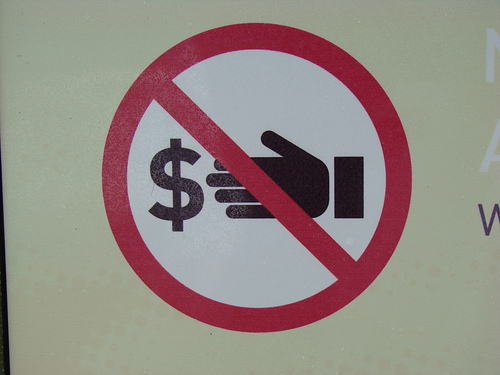Each man, in corrupting others, corrupts himself. – Seneca

Some places, especially where people from other cultures pass through, it is appropriate to let them know what is considered proper behavior. In this case, no “tipping” allowed.
What does that mean?
This quote is part of a larger discussion of patterns of corruption. It talks about how entire communities and even countries have a pattern of what is acceptable.
That pattern is usually impressed on the population as they grow up. They become comfortable with the level and type of corruption applicable to which they were born. Other rules or thresholds of acceptable corruption make them uneasy.
If you are trying to get someone to do something, and resort to corrupt means of doing so, you have crossed a boundary you used to have. What is to prevent you from crossing that line again?
How many crossings does it take before a line is no more? And the line is then re-drawn at the new boundary, the new line you won’t cross. Until you need to, and then the situation repeats.
Why is resisting temptation important?
In some cultures, a ‘tip’ is often given to those who are helpful or who provide information. Sometimes the ‘tip’ is given before, sometimes after. In other cultures, to ‘tip’ someone is considered an insult. That is a cultural thing, and varies in application and level from one country to another.
In some places, ‘tips’ are expected by officials, and in other places, such an offer will get you sent to jail. It just depends on what is expected. And that is part of the quote. If we hang around people with a different value system, we tend to go with the flow. That is the definition of temptation.
If we, as the longer passage in the book states, have someone to ‘pluck us continually by the ear’ or grab our ear and pull us away from that which is tempting us to reduce ourselves in the direction of corruption, we’d be much better off. That someone is our parents when we are children, but who does it when you are grown up?
Temptation says you can do it once, and not be changed. But you know that isn’t true. You’ve probably experienced it at some point in your life. It might even have gotten you into trouble. In response, you either became comfortable about it, or you have recoiled and re-established the line, and your resolve. And sometimes that is what it takes
Where can I apply this in my life?
This quote reminds me of the cartoons where a little angel appears on one shoulder and gives advice, then a little devil appears on the other shoulder, and gives contradictory advice. If you start down a path, it can be hard to turn away from it, and return to your original path.
This quote isn’t about defining good and evil, or right and wrong. The values the Ancients had are quite different from our own. Slavery was common in Rome, but rare in the modern world. Would they have thought buying their first slave was corruption, or just a normal thing? The culture helps to define those judgement.
Yet all cultures have rules. The enticement of someone to break those rules is one of the ways to define corruption. And an innocent person cannot do that to another without losing their innocence in the process. That line has been crossed. In the process of corrupting them, you have corrupted yourself.
Whether it’s trying to bribe your way out of a speeding ticket or enticing a cashier to overlook one of the items in your basket, it is all corruption, in one form or another. Whatever your culture considers appropriate, that is your baseline. You need to determine what is comfortable to you and what is not.
You will have to be the person who grabs you by the ear and pull yourself aside. You will have to talk sense to yourself and make sure you don’t cross the lines you consider important. This part of you is usually called your conscience. Unless, of course, you have a friend who can do that for you.
In life, it is good to have friends. However, you could just as easily find yourself spiraling deeper into corruption as you could being pulled out of it. It all depends on your friend, and where they draw their lines. Or perhaps you are the friend who will try to pull another from the downward spiral of corruption. It could happen.
The point is that we all draw the lines in different places. The effort to get someone else to move their line will move yours as well. You cannot pull someone in deeper than you already are. If you want them to move deeper, you have to take the first step. To me, that is what the quote is warning us against.
The opposite is also true, in my experience. If you are trying to move someone’s line away from corruption, you have to be even farther away from it yourself. The farther you want to move them, the farther you have to go first. The question is who are your friends, and where are you pulling each-other? And are you comfortable with that?
You will have to live with your friends, or you will have to dump them. Which way you go depends on you, your values, and whether you are winning or losing the battle to pull them to where you believe they should be. Perhaps you could talk about it over a beverage or two? You might be able to help them, or they might be able to help you.
From: Twitter, @quotesofseneca
confirmed at : http://www.stoics.com/seneca_epistles_book_3.html search for corrupts
Photo by neubie
